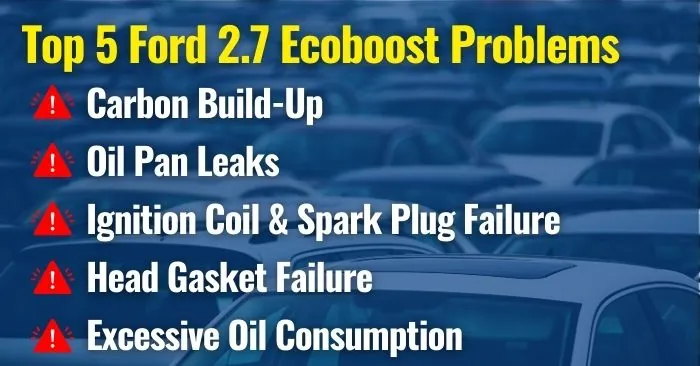
Written By: Jessica Anvar Stotz
Legally Reviewed By: Jessica Anvar Stotz

Short answer: The most common problems with the Ford 2.7 EcoBoost engine include carbon build-up, oil pan leaks, ignition coil and spark plug failures, head gasket issues, and excessive oil consumption. These issues stem from the engine’s design and the characteristics of direct injection technology. Read on to learn more about the common problems Ford 2.7 Ecoboost drivers experience and how to fix them.
Problem #1 Carbon Build-up
Carbon build-up is a prevalent issue in direct injection engines where fuel is injected directly into the combustion chamber, bypassing the intake valves.
Over time, this leads to the accumulation of oil and carbon deposits on the intake valves, which can cause various performance problems, including misfires, rough idling, and reduced power.
- What It Is: Carbon build-up occurs when carbon deposits accumulate on engine components, particularly the intake valves. In direct injection engines, fuel is sprayed directly into the combustion chamber, which prevents the fuel from cleaning the intake valves as it passes through.
- Potential Causes: The direct injection design is a primary cause of carbon build-up, as fuel is injected directly into the combustion chamber and does not clean the intake valves. Oil blow-by from the crankcase ventilation system can also contribute to carbon deposits on the intake valves. Incomplete combustion of fuel and oil over time can also result in carbon accumulation.
- Symptoms: Engine misfires are a common symptom, especially during cold starts. Rough idling or inconsistent engine performance can also occur. You may notice a significant loss of power and overall performance, and the engine might hesitate or stutter during acceleration.
- Potential Fixes: One effective method to address carbon build-up is walnut blasting, a professional cleaning technique that uses crushed walnut shells to remove deposits from the intake valves. Chemical cleaners, including fuel additives and specialized intake cleaners, can also help dissolve and eliminate carbon build-up. Regular maintenance, such as using high-quality fuel and oil, can reduce the rate at which carbon accumulates. Some newer engines use a combination of direct and port injection, which helps keep the intake valves cleaner by allowing fuel to wash over them.
Taking prompt action to address carbon build-up can help maintain your engine’s performance and prevent further issues.
Problem #2 Oil Pan Leaks
Oil pan leaks can occur in the 2.7 EcoBoost engine, often due to issues with the plastic oil pan, such as gasket failure or warping.
- What It Is: Oil pan leaks happen when the seal between the oil pan and the engine block fails, allowing oil to escape. This issue is commonly observed in the first-generation 2.7 EcoBoost engines.
- Potential Causes: The plastic oil pan can warp over time due to repeated heat cycles, which can compromise the seal and lead to leaks. Another cause is gasket failure; the RTV (Room Temperature Vulcanizing) sealant used to seal the oil pan can degrade and eventually cause leaks. Improper installation of the oil pan can also result in leaks, even after a repair.
- Symptoms: One symptom of an oil pan leak is a consistently low oil level, which may require frequent top-ups. Visible oil leaks can be seen as oil spots under the vehicle or oil seeping around the oil pan. A dashboard warning light indicating low oil pressure may also appear. Additionally, a burning oil smell, particularly after driving, can be a sign of an oil pan leak.
- Potential Fixes: To address oil pan leaks, you may need to replace the oil pan gasket, ensuring that it is installed correctly with the proper RTV sealant. If the oil pan itself is warped, replacing it with a new, preferably upgraded, pan can help prevent future leaks. Regular inspections are also recommended to check for leaks and monitor oil levels to address any issues early on.
Problem #3 Ignition Coil and Spark Plug Failures
Ignition coil and spark plug failures can occur in the 2.7 EcoBoost engine, leading to misfires and rough engine performance. These issues are often a result of the high demands placed on the ignition system by the turbocharged engine.
- What It Is: Ignition coil and spark plug failures happen when these components wear out or fail, affecting the engine’s ignition system. This problem is common in turbocharged engines like the 2.7 EcoBoost due to the increased pressures and temperatures they operate under.
- Potential Causes: Turbocharged engines put extra stress on ignition components, which can lead to premature wear and tear. Over time, ignition coils and spark plugs naturally degrade due to their operational demands. Additionally, using low-quality replacement parts can accelerate failures and cause performance issues.
- Symptoms: One of the symptoms of ignition coil and spark plug failures is engine misfires, particularly noticeable under load or during acceleration. Rough idling or inconsistent engine performance is another indicator. The engine may also hesitate or stutter during acceleration, and the check engine light on the dashboard may illuminate, often signaling misfire codes.
- Potential Fixes: To address these issues, you should replace spark plugs regularly according to the manufacturer’s recommended intervals. If an ignition coil fails, it is often advisable to replace all the coils to ensure consistent performance. Using high-quality replacement parts that meet or exceed OEM specifications can also help prevent premature failures.
Problem #4 Head Gasket Failures
Head gasket failures have been reported by some owners, leading to issues such as coolant leaks and engine overheating.
- What It Is: A head gasket failure occurs when the seal between the engine block and the cylinder head fails. This failure can cause coolant and oil to mix or escape, leading to various engine problems, including overheating and poor performance.
- Potential Causes: One common cause of head gasket failure is engine overheating, which can warp or crack the gasket. Manufacturing defects may also contribute to gasket failures, as some head gaskets may have inherent weaknesses due to production flaws. Turbocharged engines like the 2.7 EcoBoost operate under higher pressures, which can place additional stress on the head gasket and lead to its failure.
- Symptoms: Coolant leaks are a primary symptom, often visible around the engine or underneath the vehicle. Frequent engine overheating is another sign. You might also notice white smoke coming from the exhaust, indicating that coolant is burning in the combustion chamber. Oil that appears milky or frothy can suggest coolant contamination. Reduced engine performance and power can also occur.
- Potential Fixes: Replacing a failed head gasket typically requires professional assistance due to the complexity of the job. During this process, it is crucial to check for warping in the cylinder head and engine block; if these components are warped, they may need to be machined or replaced. Regular maintenance, such as monitoring coolant levels and engine temperature, can help catch issues early. Using high-quality replacement gaskets and other components that meet or exceed OEM specifications is also essential for preventing future issues.
Problem #5 Excessive Oil Consumption
Excessive oil consumption occurs when an engine uses more oil than normal, leading to frequent top-ups. This problem can arise from issues with the piston rings, valve seals, or the PCV system and may result in various engine problems if not addressed promptly.
- What It Is: Excessive oil consumption is characterized by an engine requiring more frequent oil additions than usual. This can lead to engine damage and performance issues if the underlying problem is not fixed.
- Potential Causes: Worn or damaged piston rings can allow oil to seep into the combustion chamber, leading to increased oil consumption. Faulty valve seals may also cause oil to leak into the combustion chamber, contributing to excessive oil use. Additionally, a malfunctioning Positive Crankcase Ventilation (PCV) system can cause elevated oil consumption by not properly regulating engine pressure.
- Symptoms: You may notice the need for frequent oil top-ups as a primary symptom. Blue smoke from the exhaust indicates that oil is burning in the combustion chamber. Oil spots under the vehicle, resulting from leaks, are another sign. The check engine light might also illuminate, often due to low oil levels or related issues.
- Potential Fixes: To address excessive oil consumption, worn piston rings should be replaced. Faulty valve seals also need replacement to stop oil leaks. It is important to inspect and repair the PCV system to ensure it functions correctly, replacing any defective components. Regularly monitoring oil levels and performing routine maintenance can help catch issues early and help prevent excessive consumption.

Is There a Recall for Ford’s 2.7 Ecoboost Engine?
As of August 2024, Ford is recalling nearly 100,000 vehicles equipped with the 2.7L and 3.0L EcoBoost V6 engines.
These engines are found in the F-150, Bronco, Explorer, and Edge models, as well as the Lincoln Aviator and Nautilus. The recall is addressing issues that may require a new engine for some owners following an inspection.
The Ford 2.7 Ecoboost Engine Recall follows a lengthy investigation that began in January 2022. Early failures of the 2.7L and 3.0L EcoBoost engines, known as Nano EcoBoost, were traced to fractured intake valves.
These valves could break and fall into the engine, causing significant damage. According to documents from the National Highway Traffic Safety Administration (NHTSA), the issue stemmed from brittle valves, a problem caused by a supplier’s defect. This defect was corrected after October 2021.
Ford reported to NHTSA that the investigation was prompted by 22 cases of engine failure within three months or less in Lincoln Aviator and Nautilus models.
If you own a vehicle equipped with this engine, you should monitor the ongoing NHTSA Ford investigation and consult your local Ford dealer for any relevant service bulletins or updates.
Who Pays for the Problems I’m Having?
If you’re experiencing issues with your Ford 2.7L EcoBoost engine, the responsibility for covering the costs can depend on several factors:
- Warranty Coverage: If your vehicle is still under warranty, Ford is generally responsible for covering the repair expenses. Review your warranty terms to confirm whether the issue is included.
- Recall or Service Bulletin: Should the problem be related to a recall or service bulletin, Ford will usually handle the repair costs. Stay informed about updates from Ford or the NHTSA regarding the ongoing investigation.
- Extended Warranty or Service Plan: If you have an extended warranty or a service plan, these may also cover the repair costs.
To get precise information on your coverage and any potential costs, it’s best to reach out to your local Ford dealer. They can offer detailed guidance tailored to your situation.
How Hiring a Lemon Law Attorney Can Help
If you’re encountering problems with your Ford 2.7L EcoBoost engine, a skilled lemon law attorney can provide you with guidance on your consumer rights and evaluate whether your situation qualifies for a lemon law claim.
Lemon law attorneys are proficient in negotiating with manufacturers and dealerships on your behalf. If legal action becomes necessary, your attorney will represent you in court, managing all aspects of the litigation process to safeguard your interests.
They can advocate for necessary repairs, a replacement vehicle, or financial compensation, ensuring that your rights are protected throughout the process.
The Lemon Law Experts offer exceptional legal support for individuals facing issues with defective Ford vehicles, including those with the 2.7L EcoBoost engine.
Since 2009, our attorneys have successfully secured significant compensation for clients through refunds and settlements with major auto manufacturers such as Ford.
If you have concerns about your Ford 2.7L EcoBoost engine or need help with a lemon law claim, The Lemon Law Experts are here to assist you.
We offer a free, no-obligation consultation to evaluate your situation and provide the support you need. Contact us to explore your options and take the first step toward resolving your vehicle issues today.
Citations
“Ford 2.7 EcoBoost Engine Problems Under Investigation.” Car Complaints, 2023. https://www.carcomplaints.com/news/2023/ford-27-ecoboost-engine-problems-investigated.shtml.
“Ford F-150, Bronco, Explorer, Edge, Lincoln Nautilus, Aviator Engine Failure Recall.” Car and Driver, August 2024. https://www.caranddriver.com/news/a62044486/ford-f150-bronco-explorer-edge-lincoln-nautilus-aviator-engine-failure-recall/.
“NHTSA Opens Investigation Into Ford EcoBoost Engine Failures.” Ford Authority, October 2023. https://fordauthority.com/2023/10/nhtsa-opens-investigation-into-ford-ecoboost-engine-failures/.
“Recall Report 24V-635.” National Highway Traffic Safety Administration, August 2024. https://static.nhtsa.gov/odi/rcl/2024/RMISC-24V635-2546.pdf.




